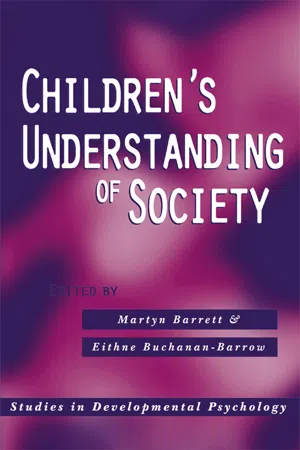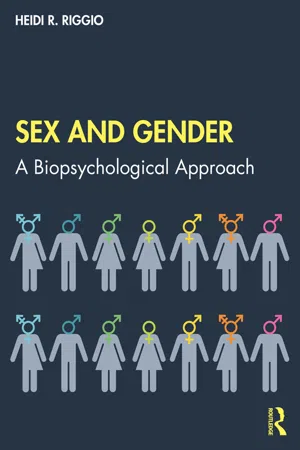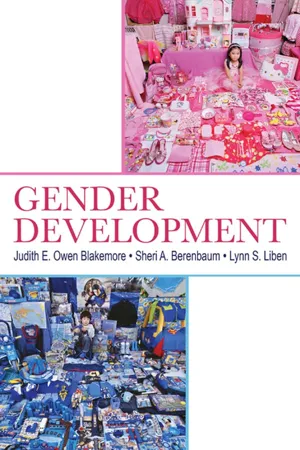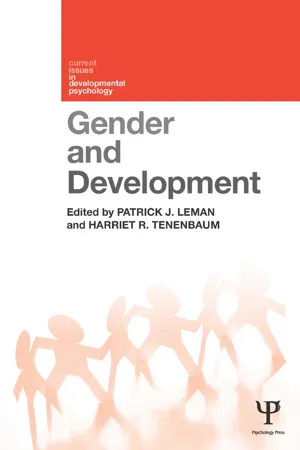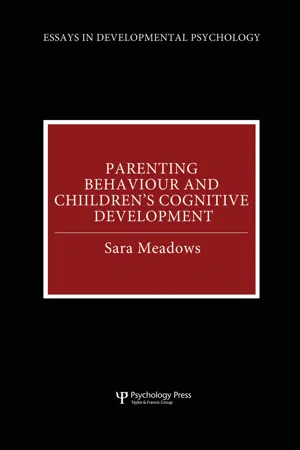Cognitive Explanations of Gender Development
Cognitive explanations of gender development focus on how children's understanding of gender roles and identities evolves as they grow. This perspective emphasizes the role of cognitive processes, such as categorization and schema formation, in shaping children's perceptions of gender. It suggests that children actively construct their understanding of gender through observation, internalization of societal norms, and self-socialization.
8 Key excerpts on "Cognitive Explanations of Gender Development"
- eBook - ePub
Gender
Psychological Perspectives, Seventh Edition
- Linda Brannon(Author)
- 2016(Publication Date)
- Routledge(Publisher)
...The social learning approach relies on the concepts of observational learning and modeling to explain how children learn and perform gender-related behaviors. Initially family members, and later the broader culture, provide models and reinforcements for adopting certain gender-related behaviors while discouraging others. Research has supported the power of children’s family and social surroundings to influence the development of gender-related behaviors, but the orderly pattern of gender development that occurs is not consistent with this theory. Cognitive theories include cognitive developmental theory and gender schema theory. Cognitive developmental theory holds that gender identity is a cognitive concept that children learn as part of the process of learning about the physical world and their own bodies. Children younger than 2 years have no concept of gender and cannot consistently label themselves or others as male or female. When children have developed gender constancy, the understanding that gender is a permanent personal characteristic that will not change with any other physical transformation, their gender identity is developed. However, research has indicated that gender constancy is among the last types of gender knowledge that children acquire, which presents a problem for this theory. Gender schema theory is an extension of cognitive developmental theory that explains gender identity in terms of schemas—cognitive structures that underlie complex concepts. When children acquire a gender schema, they change the way that they deal with information concerning gender and also change their behavior to conform to gender roles...
- eBook - ePub
- Martyn Barrett, Eithne Buchanan-Barrow(Authors)
- 2004(Publication Date)
- Psychology Press(Publisher)
...However, this correlation does not confirm a unidirectional causal relationship in respect of children's own gender role development or their understanding of gender roles in society. Instead, consistent with the broad thrust of cognitive developmental theories (and some aspects of social cognitive theory), children turn out to be discerning viewers who attend selectively to the material available and interpret it in accord with their developing naїve social psychologies of gender and their personal (though gender-linked) preferences. They also, once again, filter the information through affective processes, and are quite ready to reject ideas and images if they are incompatible with their theories and values. CONCLUSIONS Gender is given, grown, imposed, expected, regulated, learned, reflected upon, enacted, experienced, and shared. In this complex, multifaceted, and multidetermined minefield, children are actively engaged as thinkers and as emotional beings striving to determine who they are and how they relate to the social structure. Early attempts to explain gender role development tended to ignore or neglect the child's understanding. Cognitive developmental theories corrected this and inspired a large body of fruitful research, though these theories in turn have tended to neglect how children feel about gender. As in much cognitive developmental work, they tended to treat the child as a cognitive isolate or mini-scientist engaged in interesting epistemological quests with little reference to anyone else. Recent developments within cognitive developmental theory and at the points of intersection with social psychology have brought social processes and motivational and affective considerations more to the fore. Two issues emerge to guide future research...
- eBook - ePub
Sex and Gender
A Biopsychological Approach
- Heidi R. Riggio(Author)
- 2020(Publication Date)
- Routledge(Publisher)
...Good theories are comprehensive, testable, and falsifiable, integrate findings from multiple domains, and serve as a guide to researchers. Biological explanations focus on genetic and physiological processes in development of gender identity, and links between hormones and gendered behaviors, including nurturance and aggression. Social learning and social cognitive approaches emphasize the learning of gender roles and identity through observation and modeling of others’ behaviors, especially important models of feminine and masculine behavior like parents. Cognitive development theories focus on gender identity as a developmental milestone and achievement of gender constancy, the recognition that one’s gender is stable and immutable. Gender schema theory emphasizes development of mental knowledge structures (schemas) representing gender categories and roles and the use of those structures in processing social information. Social role theory is a biosocial approach that links differences in reproductive roles and other physical differences between women and men to societal division of labor. Because women and men typically occupy certain roles, they come to be seen as possessing the characteristics necessary for role accomplishment, even when they do not occupy those specific roles. Parental investment is an evolutionary approach that predicts gender differences in aggressive and sexual behavior based on sex differences in reproduction and differential investment in each individual offspring. Social dominance theory asserts that societies exist in hierarchies, with people at the top of the hierarchy enjoying a disproportionate share of societal resources and benefits, while people at the bottom suffer a disproportionate share of societal shortcomings and liabilities. Finally, feminist approaches are psychoanalytic and focus on how mothers and their powerful presence in infancy affect gender identity development of girls and boys...
- eBook - ePub
- Judith E. Owen Blakemore, Sheri A. Berenbaum, Lynn S. Liben(Authors)
- 2013(Publication Date)
- Psychology Press(Publisher)
...These expectations are, of course, fully consistent with predictions and data derived from earlier gender schema theory approaches (e.g., Liben & Signorella, 1980 ; Martin & Halverson, 1981, 1993). Concluding Comments About Developmental-Constructivist Theories As a group, the theories we have covered in this section all conceptualize children as active agents in their own gender development. Social cognitive learning theory, too, recognizes that the child’s own qualities will have an effect on the impact of the environment (e.g., acknowledging that the child’s own gender will affect the likelihood of imitating a male vs. a female model provided by the environment). In this view, child qualities are important primarily because they set conditions (prerequisites) for environmental input. The role of the child’s qualities in constructive theories is more dynamic. Children’s gender schemas control not only whether environmental stimuli are attended to, but also the way in which they are processed. Cognitive schemas can distort external information so that the environment “as understood” or the environment “as remembered” is very different from the environment “as is.” The child’s own cognitive processes and attitudinal schemas are contributors to the way that gender is conceptualized and thus to the way that the child ultimately behaves. Chapter Summary In this chapter we have reviewed theories in which children’s own cognitive characteristics are thought to play a major role in the way that gender development proceeds. These theories do not deny the importance of biological influences or the role of environmental factors. But compared to theories reviewed earlier in this book, they do place more emphasis on children themselves in determining gender outcomes. Within this chapter, the broadest level division we made was between the cognitive-environmental approach and the developmental-constructivist approach...
- eBook - ePub
- Patrick Leman, Harriet Tenenbaum, Patrick Leman, Harriet Tenenbaum(Authors)
- 2013(Publication Date)
- Psychology Press(Publisher)
...Indeed, much early research focused on gender differences in ability and personality (see, for instance, Blakemore et al., 2009). Typically such differences (even if they were associated with very small effect sizes, see Hyde, 2005) were attributed to essential biological or social processes, or somecombination of the two. While essentialist accounts are now widely regarded as simplistic, they persist in many widespread beliefs and often affect judgements and attributions for adults and children alike (e.g. Rangel & Keller, 2011). In this book, we see that essentialist beliefs may well underlie the judgements and behaviour of children in terms of their and their parents' beliefs about academic performance (e.g. Baron et al.; Tenenbaum & May), pro-social judgements (Hine & Leman), and family roles (Sinno et al.). In fact, even in areas where essentialist beliefs are being challenged the influence of such beliefs is arguably felt in participants' responses, justifications and interactions (see, for instance, contributions from DiDonato et al., Tenenbaum & May). Cognitive psychology is often presented as a means of bridging the social and biological ‘gap’ in research. Broadly, information processing and gender schema accounts (e.g. Bem, 1981) are now dominant in the literature and there can be little objection to the assertion that their appeal lies largely as explaining development as, in part, an active process where the child's own judgement and understanding has a pivotal role in the developmental process. Thus such accounts are now dominant in the field, because they provide us with a way of understanding the intersection of social and biological processes while retaining a sense in which children themselves are active participants in their own gender knowledge and growth. Broadly, the chapters in this book articulate the socio-cognitive developmental processes that are involved in gender development in different domains...
- eBook - ePub
Neural Circuit and Cognitive Development
Comprehensive Developmental Neuroscience
- Bin Chen, Kenneth Y. Kwan(Authors)
- 2020(Publication Date)
- Academic Press(Publisher)
...27.3. Explanations for psychological sex differences Hypothesized causes of psychological sex differences tend to focus on either genetic and biological factors or on social and cultural factors. Key theoretical perspectives focusing on proximal processes are considered here, with a particular emphasis on early hormonal contributions to sex differences. Readers are referred elsewhere for discussion and critiques of evolutionary explanations of cognitive and neural sex differences that focus on distal processes (e.g., sexual selection; Eagly and Wood, 1999 ; Geary, 1998 ; Hannagan, 2008 ; Wood and Eagly, 2002). 27.3.1. Socialization perspectives Most work on psychological sex differences comes from a socialization perspective, that is, that sex differences develop as an individual navigates, observes others, is socialized, and internalizes information about the social world. There are several types of socialization theories, differing in the extent to which they emphasize the role of basic social learning mechanisms, subtle socialization practices, social identity (as male or female), cognitive schemas derived from gender identity that guide behavior, and the role of gendered social roles and resulting stereotypes and expectancies. 27.3.1.1. Socialization of cognitive sex differences Socialization perspectives have been applied less to cognition than to other sex-typed characteristics. Nevertheless, there is evidence for the importance of social influences on sex-typed skills. Sex differences in spatial skills have been seen to depend on socioeconomic status (SES), with differences apparent in children from middle and high SES backgrounds, but not in children from low SES backgrounds (Levine et al., 2005). Such SES effects were suggested to result in part from access to experiences that facilitate spatial skills...
- Sara Meadows(Author)
- 2013(Publication Date)
- Psychology Press(Publisher)
...Chapter Two Theoretical perspectives: Cognitive development as primarily endogenous Introduction It must be the most fundamental question regarding the psychology of cognitive development: What models are appropriate for cognition? Are we best thought of as "in essence limited capacity manipulators of symbols" (Siegler, 1983, p. 129), so that simulation by computer is a central research strategy, perhaps even more important than looking at real humans; or as biological organisms with a long evolutionary history which has led us to have a brain which functions in particular ways and leads to particular cognitive activities, just as we have evolved lungs to breathe in a particular way, livers with a particular range of digestive powers, and a thumb articulated with fingers so that fine grasping is possible; or as members of social groups taking part in relationships and in cultures, and using and developing our cognition within them and inseparable from them? Different models of human nature make different decisions about the relative importance of these models, whether to prioritise the social, the biological or the formal, whether to think of cognition as computation or adaptation or acculturation. Each model has enabled us to inch towards improved understanding of cognition, but each has its costs as well as its benefits. The big divide, I think, is between those models where development is largely asocial and predominantly endogenous, and those where it is socially constituted or exogenous. There is a basic philosophical divide here which places Hegel on one side and Kant on the other (see, e.g. Markova, 1982); or, in contemporary work, at one extreme we have nativist theories postulating innate ideas (e.g. Fischer & Bidell, 1991; Fodor, 1981, 1983; and see also Plomin, 1994b; Plomin & McClearn, 1993) and at the other we are essentially constituted by our society (e.g. Bronfennbrenner & Ceci, 1993; Mayall, 1994)...
- eBook - ePub
- Peter Mitchell, Fenja Ziegler(Authors)
- 2013(Publication Date)
- Psychology Press(Publisher)
...Chapter 3 DOI: 10.4324/9780203736357-3 Contents Introduction Stages of cognitive development Piaget’s explanation of cognitive development Traditional learning theory as a contrasting explanation of development A supplement to Piaget’s theory: Self-centered adolescents Summary The development of thinking 3 Chapter Aims To introduce Piaget’s theory of cognitive development. To detail Piaget’s stages. To detail the evidence that lends support to Piaget’s stage theory. To present the mechanism that Piaget posited as responsible for cognitive development. Introduction The discipline concerned with studying the development of thinking is cognitive developmental psychology. The word “cognitive” refers to knowledge, but not necessarily according to the common meaning of the word. When people talk about knowledge, they usually mean the kind of information useful for answering questions in games such as The Weakest Link or Who Wants to be a Millionaire, or in order to do college exams. In contrast, cognitive developmentalists think of knowledge as referring to understanding about things. You might have noticed a child aged around 5 years speaking on the telephone about things only he can see: He seems to overlook the fact that the person he is speaking to is in a completely different location and cannot see the same things. Perhaps this is a sign that the young child is incapable of putting himself in someone else’s shoes. In the broadest sense, it is tempting to suppose that the child does not understand that other people can have different perspectives. Cognitive developmentalists look at particular difficulties children have, such as poor communication ability, and then draw general conclusions about their underdeveloped knowledge of the world...

